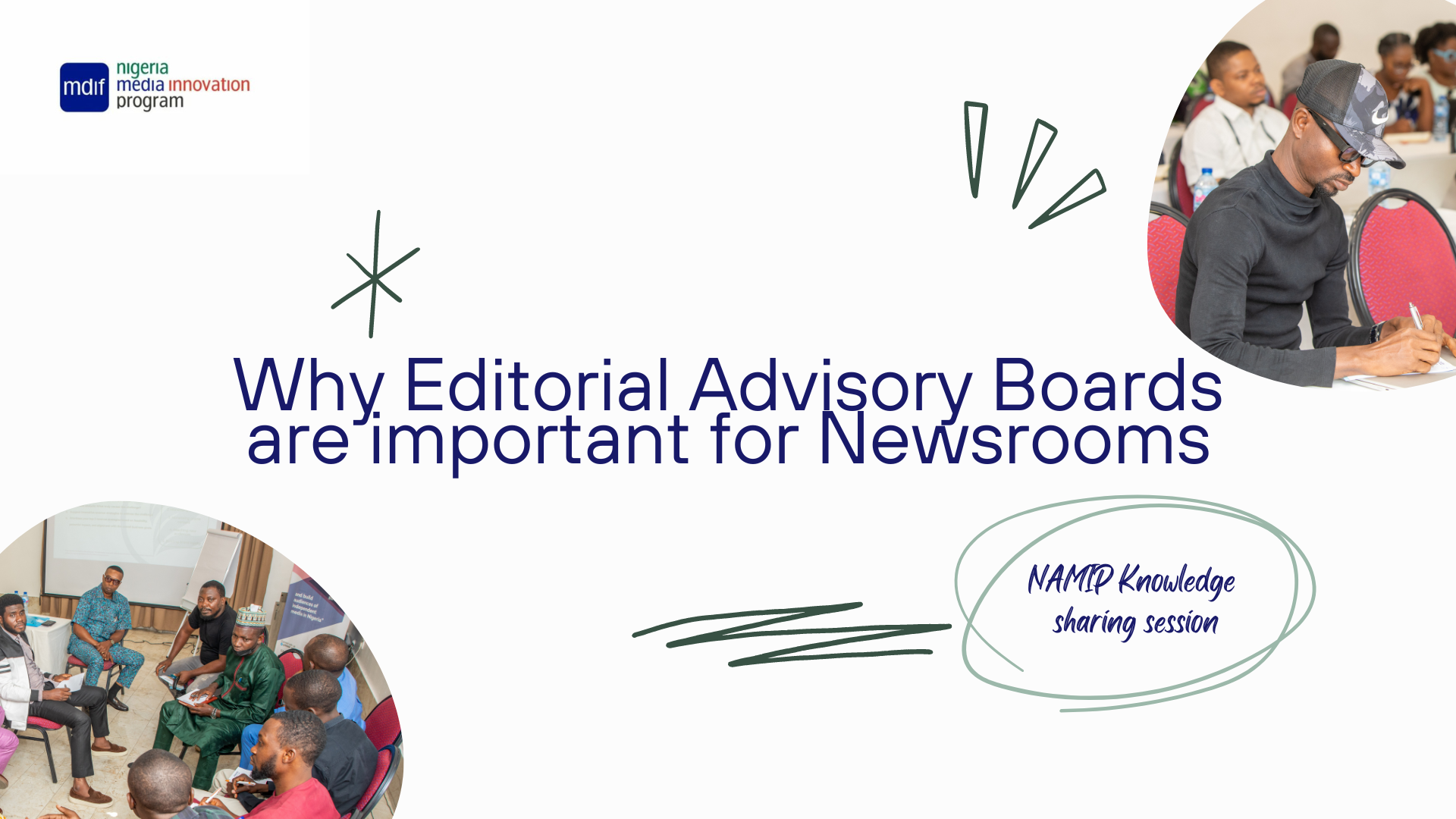By Vivian Ojomu
During NAMIP’s third knowledge-sharing session—where participants within the program share experiences on how they solved important problems—Frank Aigbogun, the Publisher of BusinessDay Newspaper, an organisation with over 20 years of experience in the media industry, shared the rudiments of editorial advisory boards for newsrooms. His insights highlighted how such a board is key to a media organisation’s credibility and ongoing success.
Frank explained that the Editorial Advisory Board at BusinessDay is central to supporting the organisation’s mission of delivering accurate and relevant business intelligence. By offering strategic direction and expert counsel on critical socio-political and economic matters, the board ensures that BusinessDay remains a trusted and respected source of business news and analysis across West Africa.
Functions of the Editorial Advisory Board:
- The board’s expertise directly shapes BusinessDay’s editorial content, ensuring accuracy and relevance to global trends. This depth of knowledge keeps BusinessDay relevant, providing readers with a well-rounded view of key issues.
- For over ten years, the Editorial Advisory Board has guided BusinessDay through market changes while insisting on high standards.
- One of the most important roles of the board is providing feedback to senior journalists and editors. According to Frank, these insights often lead to actionable changes in how BusinessDay covers major economic trends and issues. This kind of real-world impact goes beyond the newsroom, as it influences public discourse and even business decision-making.
- All board discussions at BusinessDay are held under the Chatham House Rule, ensuring confidentiality. This creates a space where board members can speak freely about sensitive issues without fear of attribution, fostering richer, more honest discussions that can drive editorial direction.
Key Differences Between an Editorial Board and an Editorial Advisory Board
While both boards are crucial to a newsroom’s success, their roles and responsibilities differ, Frank took the time to explain the difference between both:
An editorial board is directly responsible for the content and editorial direction of the newsroom. It consists of industry experts, senior editors, staff writers, and other internal members who make day-to-day decisions on the organisation’s output. The editorial board often determines the stance of the organisation on key issues, approves articles for publication, and ensures that content aligns with the organisation’s vision and mission. While an Editorial Advisory Board serves a more consultative role. Composed of external experts, thought leaders, and industry professionals, its primary function is to provide strategic counsel and feedback on the organisation’s overall direction. The advisory board does not get involved in daily editorial decisions but offers long-term guidance, helping the organisation stay aligned with industry trends and maintain its reputation.
Qualities Editorial Board Members Must Have:
To effectively guide a media organisation, editorial board members should possess several key qualities:
- Expertise in Relevant Fields: Having a deep understanding of the industry is essential. It ensures that board members can provide valuable insights and offer guidance that directly enhances the newsroom’s output.
- Leadership and Vision: Board members must be forward-thinking, able to anticipate trends, and offer strategic advice that keeps the publication relevant in a fast-evolving media landscape.
- Commitment to Integrity and Ethics: Upholding journalistic standards and ensuring that the organisation’s content adheres to ethical guidelines is critical to maintaining the trust of readers.
- Objectivity and Impartiality: Board members need to remain neutral and avoid conflicts of interest, ensuring that their guidance is free from bias and contributes to the credibility of the publication.
- Passion for the Industry: Finally, a genuine interest in the organisation’s mission and vision is crucial. Board members must care deeply about the publication’s role in informing and shaping public discourse.
Frank clarified that BusinessDay’s Editorial Advisory Board has been a key player in their organisation’s continued success. By providing strategic guidance, offering expert feedback, and fostering strong connections, the board ensures that BusinessDay remains a leader in business journalism not only in West Africa but also in the broader international market.
Their contributions help the publication stay true to its mission, adapt to changing times, and maintain a high level of trust and credibility with its readers. In this way, the Editorial Advisory Board is an essential component of BusinessDay’s ongoing influence and relevance.

